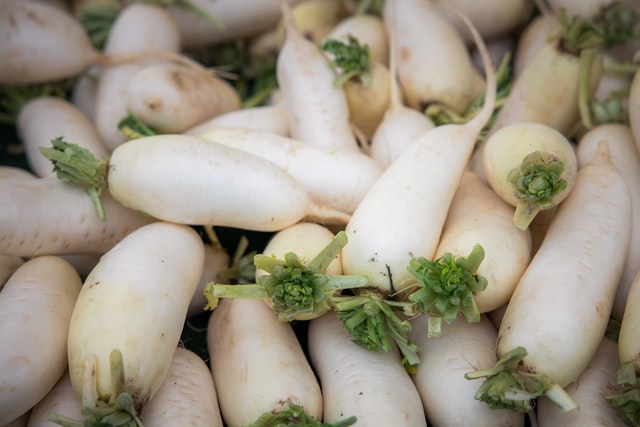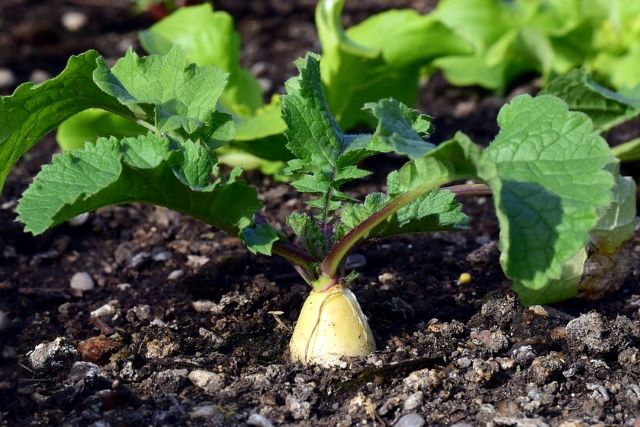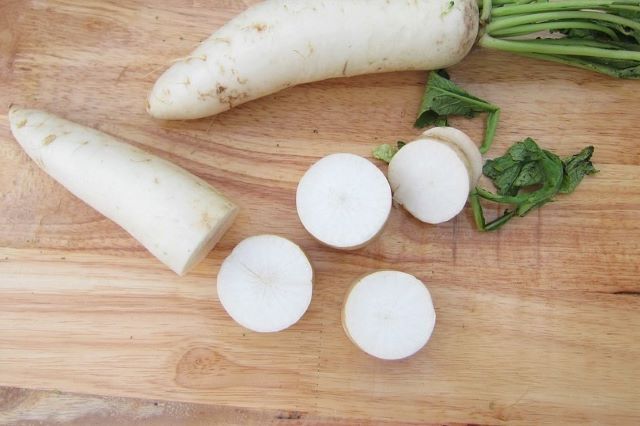Daikon has a notably mild taste that is simultaneously sweet, spicy, and bitter. This mild flavor decreases in its boastful flavoring when cooked. A rather crunchy vegetable, like carrots, daikon can sometimes come across as distractingly bitter. So in this article, we’ll answer ‘Why Is My Daikon Bitter?’ And provide beneficial tools to simmer down overly bitter daikon so that you can enjoy this incredibly popular and nutritious vegetable.

Table of Contents
Why Is My Daikon Bitter?
The cause of daikon being bitter might not be because it’s “bad”. The fault lies somewhere else.
Daikon already has a sharp taste that can come across as slightly bitter. That bitter taste can be enhanced if the daikon has experienced plant stress before its harvesting period.
The main cause of overly bitter daikon is due to plant stress during the growing stage. Plant stress causes a chemical compound, called cucurbitacin, to increase and this causes the daikon bitterness.
The causes of plant stress, and the eventual bitter taste, can be difficult to prevent but providing the ideal growing conditions for daikon can drastically lower the stressors on the plant. This in turn will reduce side effects like bitterness.
Environmental Stress Cause Daikon Bitterness

When daikon, sometimes referred to as “winter radish”, is grown and harvested in hot temperature climates, this can cause the development of bitterness in the taste of daikon.
Environmental stress, which includes occurrences like large temperature swings and high temperatures, can cause bitterness in daikon. As a cool-season vegetable, daikons grow best in temperatures ranging from 50-65 °F (10-18 °C). If daikon is grown in warmer weather, the rise in heat triggers cucurbitacin levels to increase.
Cucurbitacin is a group of biochemical compounds called tetracyclic triterpenes that some, not all, plants have. This group of highly oxygenated biochemical compounds are mainly found in the Cucurbitaceae family which includes cucumbers and pumpkins. But are also found in the Brassicaceae family, of which daikon is a member.
Low Soil Fertility Can Cause Bitter Daikon
When there is low soil fertility, the amount of nutrients provided in the soil does not align with the amount of nutrients needed for the daikon being harvested. The quality of the soil decides the success of the daikon plants grown in it.
For a successful daikon harvest, there should be a regular application of fertilizer and organic matter added to the soil. This allows for adequate nutrient supplies for the daikon plant.
Follow the guidelines of ‘less is more’ as over-fertilizing can lead to algal overgrowth and then oxygen depletion in waterways.
I recommend testing the soil at the beginning of a new growing period and based on the results utilize fertilizer and lime to come to a beneficial balance of soil fertility.
The Wrong Soil pH For Daikons
If the soil pH is too acidic (low) or too basic (high), then the daikon plants will have difficulty absorbing the soil nutrients. This results in physical symptoms such as yellow leaves, a lack of flowers or fruit on the plants, or stunted growth.
The resulting plant stress causes a rise in cucurbitacin levels, hence an overpowering bitterness in daikon versus the usual mild sharp, bitter taste that is common.
Don’t Eat Daikon If It’s Mushy
It’s a good rule of thumb to consider most vegetables that are “mushy” as a no-go for eating. That’s usually a signifier that the vegetable has gone bad. The same can be said for daikon.
Fresh daikon will be firm and crunchy. If the daikon is mushy or has mushy spots, then I don’t recommend eating it.
Instead, make sure when you buy your daikon from your local grocery store, that the daikon is fresh. It should be firm without any notable marks that show mushiness or signs of the daikon going bad.
How To Get Rid Of The Bitter Taste Of Daikon

There are a few different methods that can be used to remove that bitter taste from daikon.
First Method: Salt and Wash the Daikon to Reduce Bitterness
If you plan on using your daikon in a pickling recipe or desire to eat it uncooked on a salad or otherwise, this step is recommended to remove the bitterness from the daikon.
All that’s required is salting the daikon, allowing it to sit for around five minutes. Then, wash the daikon, and voila! The bitterness has been greatly diminished. The sprinkling of salt helps remove the bitterness…but how?
Salt is often used to suppress bitter flavor compounds in food. The sodium ions in the salt zone in on bitter flavor compounds and suppress them. This results in a palatable taste that is sweeter or neutralized in flavoring due to the suppression of the bitter flavor compound.
Here is a recipe that salts daikon you might like to try:
- Shredded Daikon Salad – from Bon Appetit
Second Method: Steam The Daikon to Reduce Bitterness
Steaming the daikon before using it can drastically improve that bitter taste! Start by boiling a pot of water. Add the steamer layer attachment to the pot, then drop in the cleaned daikons. Place the pot’s lid on and allow the daikons to steam for 5-10 minutes.
To keep a semblance of “crunchiness” with the daikon, I recommend steaming for five minutes rather than ten minutes. If you desire steamed daikon for your recipe, then steam the daikon for 10-15 minutes.
In five minutes, there will be a notable difference. The daikon will taste less bitter, but there may be a lingering taste of bitterness. With the longer steaming times, the bitterness of the daikon will drastically decline.
For a few example recipes, see below:
- Boiled Daikon Radish – from The Woks of Life.
- Simmered Daikon – from Onolicious Hawaii.
Third Method: Bake the Daikon to Reduce Bitterness
Baking the daikon can be another method of improving upon the bitter flavor that curls your tongue with the littlest of bites.
Similar to steaming the daikon, baking the daikon holds the same success.
For a colorful dish packed with nutrients and flavor, you might like this recipe:
- Roasted Daikon Radish, Carrots, and Peppers – from Sarah’s Cucina Bella.
The star of this recipe is the daikon radish. By roasting the daikon, along with other veggies like peppers and carrots, the sharp bitterness of the daikon lessens while enhancing other flavors that so many love about this popular root vegetable.
Daikon Recipe Ideas
If you’re looking for more ways to use daikons, you might like to try one of the following recipes:
- Pickled Daikon – from It’s Not Complicated Recipes.
- Spicy Roasted Daikon Radish French Fries – from Cooking on the Weekends.
- Daikon & Cabbage Stir Fry – from Lilly’s Table.
Some of My Favorite Kitchen Items:
Further reading:
- Quick Pickled Radishes Recipe
- Quick Pickled Radish Greens Recipe
- How to Grow Radishes: the Easiest Vegetable to Grow
- Turnips Vs Radishes: What’s The Difference?
- Why Is My Asparagus Bitter?
- Eating Turnip Greens With Recipe Ideas
- Why Is My Rutabaga Bitter? Here’s What You Need To Know
- Why Is My Onion Bitter? Answered!
